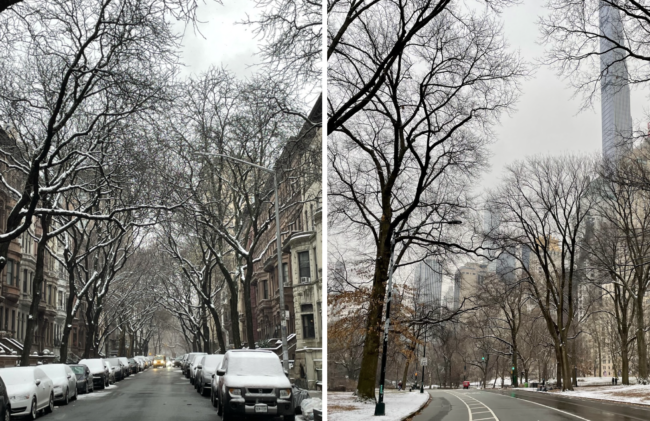Tuesday, January 16th, marked Fieldston’s first snow day of the 2023-2024 school year and another milestone: it ended the 701-day snowless streak in New York City. Central Park saw just over one inch of snow, so, while it was not a whiteout, it was enough to end the drought.
I asked John Davitt, Chief Meteorologist at New York 1 News, whether the overall lack of snow is a result of climate change and global warming. He stated, “Sunday, January 14th, marked 700 days since NYC saw a 1″ or greater snowfall. It’s the longest streak we’ve seen and records go back 154 years to the 1800s…before the invention of the light bulb!” Davitt explained that the reason for this gap is complicated but related to climate change: “2000 to 2020 were one of the snowiest periods on record for NYC and also the warmest globally and locally.” This shows that NYC can be both very warm and still get a large amount of snowfall in a natural way. Davitt explained that climate change isn’t only about rising temperatures; there are many other factors. One reason, which holds true for both winter and summer, is that an increase in water vapor and a warmer atmosphere can hold more moisture, leading to wetter storms. He stated, “At some stages of climate change, the increase in storm strength and moisture can result in more snow but at some point, the atmosphere is too warm for snow.” That tipping point could occur at any time and it is very unpredictable whether we could see snowfall this winter. It will be important to see if this trend continues over the next 5 to 10 years.
Fieldston students have expressed disappointment about the lack of snowfall this year and the effects on our earth. Caitlin Neidow (Form V) stated, “I am sad knowing that my future kids and the next generation may grow up probably not ever knowing what a snow day is. There is a sentimental part of it because snow days have always been very fun but at the same time it shows how our earth is changing and warming.” Many students who grew up with snow days and going out to play and sled in the snow share Neidow’s feelings. Macy Griffith (Form V) states, “It is very sad to know where our earth is now and I could always remember many years ago when there would be a lot of snow with multiple snow days a year. Now it feels like snow is such a rare occasion and even when it does snow there is so little of it. It is normally very warm the next day so the snow doesn’t last.”
Tuesday morning, the hill schools announced that we would have our first snow day of the year, and students were overjoyed. Rachel Shames (Form V) says, “After years without a proper snow day, I am so excited to finally have one!” Noa Saviano (Form V) adds, “I am excited about the snow day because it gives me more time to work on my essays and study for the math final on Friday. I wish they had told us earlier because I would have been able to plan my night better last night. The snow day gives me more time to study on my own instead of in class, which wouldn’t have been as helpful.” Overall, students are excited about this snow day.
While Fieldston students seem mostly upset by the lack of snow, New Yorkers have mixed feelings. Davitt posted a Twitter poll to gauge New Yorkers’ sentiments around the record. Davitt found the split between happy and sad being even very interesting. “Concerned” was the highest percentage response, but his takeaway was that people are confused particularly because they are uneducated about the topic.
2023 was the hottest year on record by a considerable amount. The Guardian reported, “The planet was 1.48C hotter in 2023 compared with the period before the mass burning of fossil fuels ignited the climate crisis.” This number is almost precisely the temperature target set by countries in the Paris Agreement in 2015. The Paris Agreement was a treaty that focused on reducing the emission of gasses that contribute to global warming. The treaty was created in Paris at the United Nations Climate Change Conference and the objective was to limit greenhouse gas emissions for global temperatures to not exceed 2℃ above their benchmark levels before the Industrial Revolution (that temperature was later changed to 1.5℃.)
What is in store for the future of snow in New York City? While our planet and city are very hot, Davitt believes we aren’t at a catastrophic place or a tipping point of global warming that certain climate models show us achieving in 2070 and beyond. Throughout his 30-year career Davitt “has seen high snow years and low,” and believes that we’ll get a bounce-back snowfall year in the near future.






